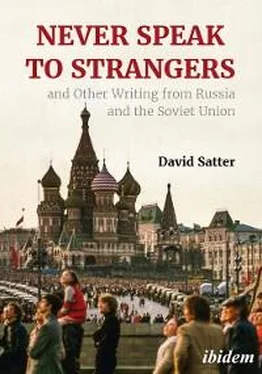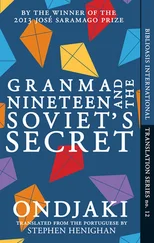1 ...6 7 8 10 11 12 ...37 "In your country when prices go up,” said Volodya M., a physicist in his late 50s, “salaries go up, too. But in some Soviet professions, salaries haven’t been increased in years.”
There had been rumors since last summer that major price increases were on the way, but Russians, wise to the ways of their government, realized the rumours were true when the press announced in December that the government was increasing salaries.
The salary increases averaged 4 rubles ($5.32) a week for 31 million low- and middle-income employees, and were presented as another step forward in improving the Soviet citizens standard of living.
On closer examination, however, it was clear that the salary increases only took immediate effect in the far north, Far East, and Siberia and were consistent with the established Soviet policies of paying differentials to attract workers to cold and remote areas.
The price increases, however, apply uniformly throughout the Soviet Union and will go into effect this spring.
The reaction of the Soviet public was angry and swift. “Khrushchev said we would have communism by 1980,” said one disgruntled young father bitterly, "yet our life gets worse and worse.”
On the street, people grumbled about the increases, which were the first announced major price increases for basic services or commodities for many years, and said that they feared that more increases were on the way.
“Believe me,” said one young secretary, “this is just the beginning.”
The news of price increases had a demoralizing effect, in part because the Soviet assertion to be an inflation-free society contains a great amount of truth. Prices have increased less than 1 per cent a year, according to Soviet statistics, and almost all basic costs such as for food, municipal transport, rent and utilities have not risen in decades.
This, however, does not mean that the Soviet Union is a shopper’s paradise. The average wage in the Soviet Union now stands at about 150 roubles (about $200) a month and a new winter coat can easily cost that much. A new Soviet Zhiguli automobile costs an average Soviet citizen four years’ salary.
When the price increases were announced, Nikolai Glushkov, the chairman of the state committee on prices, said they were necessary because the additional cost of re-equipping the taxi fleet, civil aviation and the sea and river fleet had caused many enterprises to operate at a loss.
Such logic would appeal to any capitalist, but the difficulty with such reasoning, at least as far as the Soviet consumer is concerned, is that it can be extended indefinitely. The prices of many goods in the Soviet Union are kept artificially low. Last year, the government spent 19 billion roubles, for example, to subsidize the sale of meat and milk at stable retail prices.
If the Soviets decide to begin applying a little capitalist logic to other areas of the economy, perceptible inflation could become even more worrying in the Soviet Union than it is in the West because it would erode the floor of stable prices on which hopes for better Soviet living standards have always been based.
In that case, Soviet consumers might have to learn to fulfil the expectations of a Moscow cabbie who, when asked how he thought people would react to the new doubled cab fares, said, “They’ll get used to it.”
The Financial Times, Monday, March 7, 1977
The Dissidents Who Strive for
Western Freedoms in Russia
“These people are only guilty of gathering information. We have no free Press in this country, if, under these conditions, they are arrested for gathering facts, then how can you continue to speak of the Helsinki Agreements?”
The speaker was Dr. Valentin Turchin, leader of the Soviet branch of Amnesty International. The scene was his apartment shortly after the arrest this month of three members of various unofficial Helsinki monitoring committees: Dr. Yuri Orlov, Mr. Alexander Ginzburg and Mr. Mikola Rudenko.
His audience consisted of three westerners and a group of dissidents including Orlov’s wife, Irina, the veteran dissident Mrs. Lyudmila Alexeyeva, who was to get her exit visa a few days later, Father Gleb Yakunin, leader of a committee to defend religious rights, and Mr. Evgeni Yakir, a Jewish activist. They represented the 50 or so people in various dissident movements who can be considered activists.
All look to the outside world for moral, political, and psychological support, aware that they are striving for freedoms in the Soviet Union that are guaranteed as a matter of course in the West. To work for western freedoms in the Soviet Union is to give up any hope of being integrated into Soviet society. Prominent dissidents face arrest and imprisonment, and an assured end to their careers. Among the well-known dissidents, only Dr. Andrei D. Sakharov, the Nobel Peace Prize winner, still holds a job. He works alone, doing purely theoretical work as a senior scientific associate in the Institute of Physics of the Academy of Sciences. Almost all the others were fired as an immediate consequence of their decision to speak out.
Dr. Orlov, a physicist and corresponding member of the Armenian Academy of Sciences, was removed from his position as senior scientific associate in an institute near Moscow in 1973, after writing a letter to Mr. Leonid Brezhnev deploring the “shabby campaign in the Press against Dr. Sakharov.” Dr. Turchin, also a physicist, was demoted from chief of a laboratory, after issuing a public statement in defence of Dr. Sakharov. He was publicly denounced at a meeting attended by 300 of his colleagues, not one of whom voted publicly in his favour, and was eventually fired in July, 1974.
Father Yakunin lost his job in 1965 after protesting against what he considered violations of the rights of believers and many of the Jewish “refuseniks,” persons who requested visas to Israel but were turned down, lost their jobs as soon as they applied to emigrate, and are now working in Moscow as night watchmen and lift operators.
Because of the economic consequences, dissent in the Soviet Union is not a youth movement. Most of the dissidents are over 40 and in severe financial straits, earning money by giving private lessons or doing translations. Many are scientists or mathematicians, a reflection of the fact that these professions are considered necessary to the State and have always enjoyed slightly more freedom from ideological control as a result.
Having lost their jobs in a society where the State is the sole employer, the active dissidents learn that it’s almost impossible to find new ones. Most institutes or publishing offices have a “first department” with links to the KGB and access to detailed personal and political information about a prospective employee. In addition, in many institutes an applicant must be approved by both the institute and the local party organisation, and an employee’s social and political record is subject to periodic review. If an active dissident is ultimately offered some kind of work it may be as a manual labourer. Mr. Vladimir Slepak, an engineer by training and a member of the Helsinki monitoring group who has been trying for the last seven years to emigrate to Israel, has not worked since 1972. In that year he was offered and turned down a job as a loader in a concrete plant.
The decision to speak out, to refuse to lie “quieter than the water and lower than the grass” was at one time or another taken by all the active dissidents. In itself, however, the act of speaking out will not usually lead to imprisonment and arrest. The Soviet Union today is a more liberal country than it was 15 or even ten years ago, when it was possible to receive a prison sentence just for possessing Alexander Solzhenitsyn’s novel Cancer Ward. The circulation of works of literature in typescript (samizdat), was also major crime. Now imprisonment and arrest come when the dissidents try to exercise those freedoms which they have supported orally.
Читать дальше












